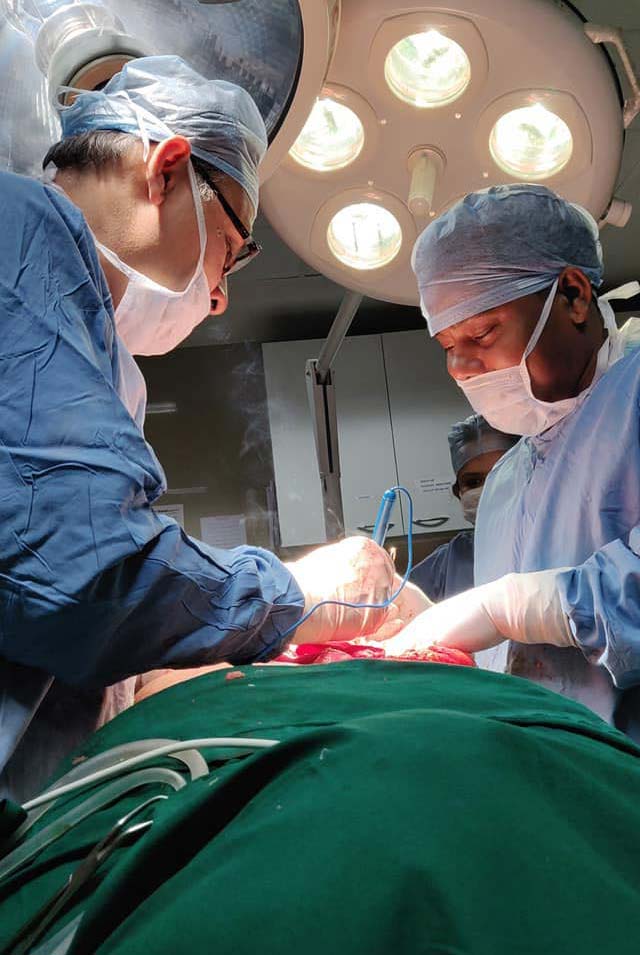-
Why only the Gall bladder stones are not removed?
A gall bladder containing stones is a diseased gall bladder and isn’t performing its function. If only
stones are removed new stones will form quickly. Therefore, the gall bladder must be removed.
-
Is it possible to get only the stones removed?
Theoretically possible but logically it is stupidity! Moreover, taking out the stones only isn’t
regarded as the standard of care. A surgeon might be held negligent in his job if he does so.
-
Can’t you crush the stones with laser and can`t I pass it in urine?
No. crushing of stones is done in kidney stones and you can perfectly flush out the sand in urine if
you take lot of water. But gall bladder isn’t a part of urinary system. It is a part of digestive system
where flushing by excess water doesn’t work.
-
I think laparoscopy is done under local anaesthesia, am I right doctor?
No, laparoscopy is generally performed under general anaesthesia and never under local
anaesthesia. Rarely is it done under epidural anaesthesia too.
-
My elderly father who is also a heart patient has stones in gall bladder. Don`t you think
laparoscopy will be the best option?
Decision of laparoscopy is joined taken by surgeon, anaesthetist and cardiologist if the patient has
significant cardiac ailment. Most doctors advice open surgery because it has been proved open
surgery put less stress on the heart. Therefore, contrary to the common belief.
-
Are all gall bladder stone surgeries possible through laparoscopy?
Almost all, if not all; but depends on anatomy of the gall bladder, complications present, and
controversially, skill of the surgeon.
-
What is difficult anatomy you mean?
It will call for a knowledge of anatomy of the gall bladder and the relationship of the cystic duct to
the bile duct. Suffice it to say here that any abnormality which endangers operative injury to the bile
duct is regarded as difficult anatomy.
-
What will you do in that situation?
Any sensible and mature surgeon will abandon laparoscopy and complete the surgery by open surgery.
-
Will conversion to open surgery make me weak or infirm?
No, absolutely not. In fact open surgery had been the gold standard in eighties and nineties, but
as laparoscopy became popular, open surgery has lost its preferred place, but still retains its position
as the salvage procedure when the surgeon faces a difficult situation. Except a bigger scar, and more
pain open surgery doesn’t make one weak or infirm. Incidence of Postoperative Hernia is slightly
more in open surgery, but with due care this complication can be avoided also.
-
My uncle told me during his laparoscopic surgery the surgeon couldn`t remove all the stones. So, I
am scared to choose laparoscopy!
To answer to this question I`d say that the comment is wrong and the person wasn’t probably
explained about the procedure. In laparoscopic gall bladder surgery a surgeon removes the gall
bladder itself, not the stones. Now you can well realize why the comment above is wrong!
-
But I heard about patients who needed some extra procedures after laparoscopy. Why do they
need so and what exactly is done?
In a patient with gall bladder stones, tiny stones can come out of the gall bladder and lodge in the
bile duct. This condition is generally indicated by raised liver enzymes – SGOT, SGPT, and Alkaline
Phosphatase with raised conjugated Bilirubin some times. An MRCP can confirm it. If confirmed
before laparoscopy, an ERCP – an endoscopic procedure to extract stones from the bile duct, with or
without stent placement in the bile duct is done by gastroenterologists. Generally ERCP is done
before laparoscopy, but if unfortunately Bile duct stones weren`t suspected pre-operatively because
of normal LFT, sometime ERCP is done after laparoscopy too.
-
Why some patients have a tube after surgery?
This is called a drain in surgical language. During surgery the surgeon dissects tissue, cuts some,
burns some and finally leaves the field dry. If he thinks the field isn’t unquestionably satisfying, most
surgeons will leave a drain near the gall bladder area so that if there is any collection of blood or
serum and in rare cases bile forms it can come out. Otherwise, trapped inside, the fluid can turn into
an abscess.
-
Is it true that after gall bladder surgery a patient cannot eat normal food? Is it a fact that all life
he/she will have to take boiled diet?
No, this is not true. Most patients take normal diet from first week.
-
Stones have been detected in my gall bladder during USG for a different reason. Do I need to
undergo surgery immediately?
Not necessarily. But a subgroup of population, such as Diabetes, young age at diagnosis, sickle cell
anaemia, big sized stone, concomitant polyps etc. are recommended to undergo surgery.
-
My USG report says I have polyps in the gall bladder. Do I need to get it removed?
Gall bladder polyps if they are more than 10 mm in size should undergo surgery.

